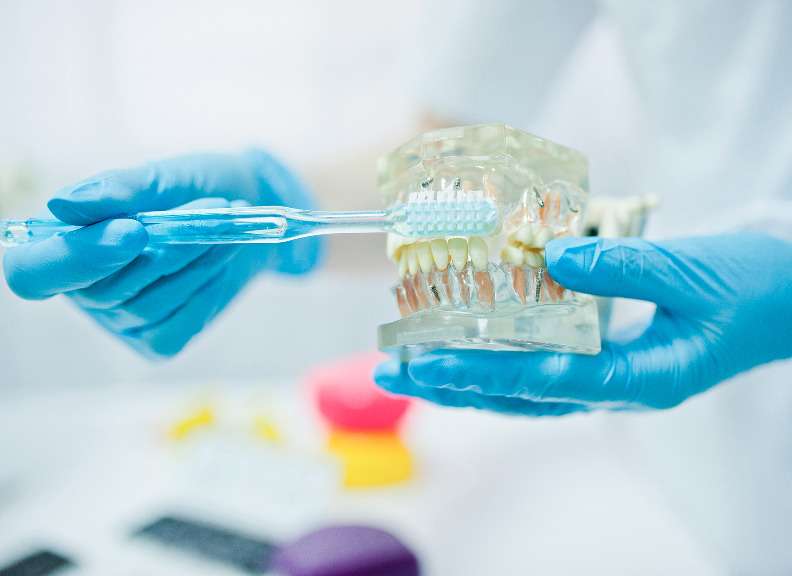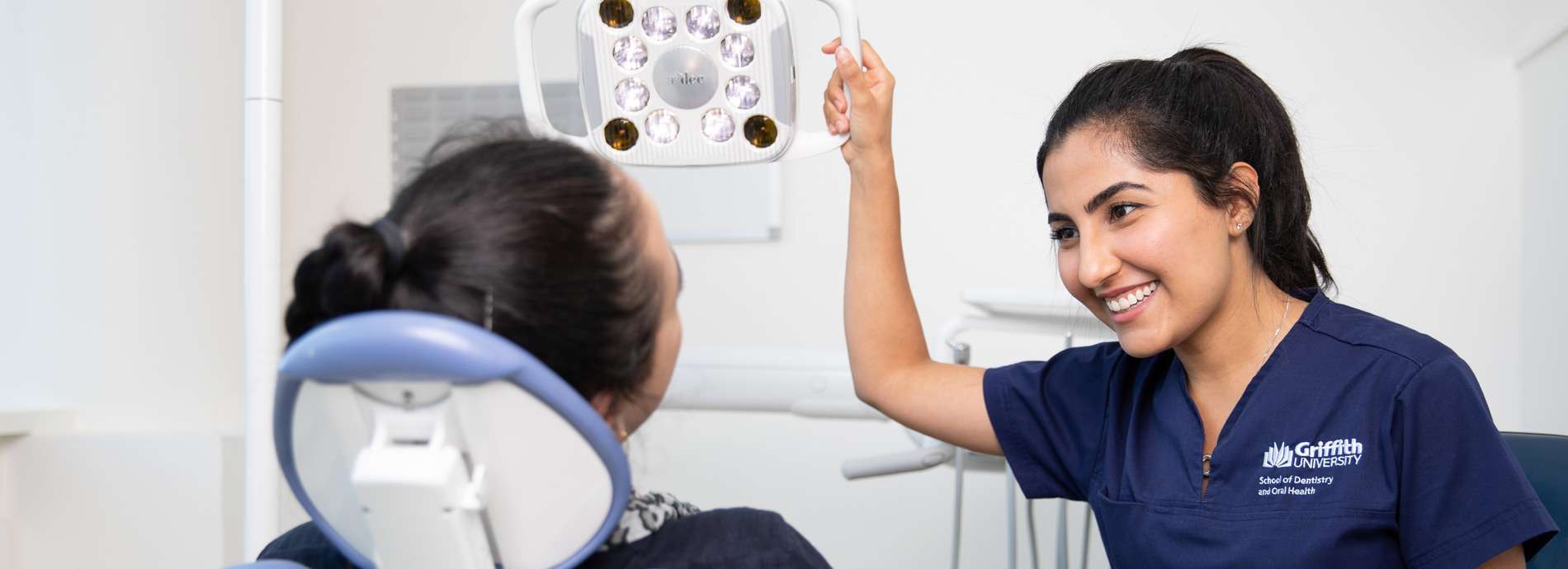Outline
Outline
Promote oral health in the community and provide a range of clinical services, including dental examinations, preventative treatments, scaling and cleaning, the management of gum disease, fillings, simple extractions for children, dental radiography, taking dental impressions and a range of orthodontic duties.
This course starts with a study of preventive dentistry and oral health therapy techniques, together with relevant health, research and communication units that form part of your interprofessional first year.
In your second and third years your studies will combine theory, practical sessions and clinical practice.
You will undertake more than 750 hours of clinical training during the course in a variety of settings such as the Oral Health Centre of Western Australia, community clinics, private dental practices and the Dental Health Services’ clinic.
When you graduate you will have the practical industry skills and experience you need to start your career in oral health therapy with confidence.
Please refer to the handbook for additional course overview information.
What jobs can the Bachelor of Science (Oral Health Therapy) lead to?
Careers
- Oral health therapist
Industries
- General and specialist private dental practices
- Government school dental clinics
What you’ll learn
- provide appropriate patient care and dental health education by applying sound clinical principles and behaviour management techniques conducive to good oral health
- use problem-solving, critical thinking and decision-making skills in the management of oral disease in individuals and the community
- identify oral disease, gather and interpret data and synthesise information to develop appropriate preventive and treatment approaches as part of the overall needs of individuals
- communicate effectively with other health professionals, patients and various target groups
- use new and existing technologies relevant to dental practice in a responsible and effective manner
- utilise lifelong learning skills to help foster ongoing personal and professional development
- promote the oral health and general health of individuals and the community by working collaboratively, sharing knowledge and considering different perspectives
- demonstrate cultural awareness and understanding in the provision of patient care
- practice in a professional and ethical manner as part of the dental team and critically reflect on care provided.
Bachelor of Science (Oral Health Therapy) application requirements
If you’re looking to apply for our Bachelor of Science (Oral Health Therapy), please refer to our admission requirements before completing your application.
Things to know before you apply
- Selection is based on academic performance.
- As in most dentally related courses contact hours are high and additional clinical hours are required during inter-semester breaks.
- Curtin requires you to be screened for and vaccinated against, a number of communicable diseases before commencing fieldwork. There is an onus on individual students to be aware of their immunity or carrier status in relation to communicable diseases. Depending on the status of any communicable disease there is the possibility that you may not be able to complete the clinical placement requirements of the course. Students who are carriers of blood-borne viruses are not permitted to perform some procedures on patients. Serological testing must, therefore, be completed prior to or during the first semester of study in the course and the results communicated to the area Administrative Assistant.
- Students are required to practice techniques on one another before being permitted to move into patient care.
- You must complete a Senior First Aid Certificate course before you proceed to your second semester.
- There is some travel involved with different aspects of the program delivered on the Perth campus, at the Oral Health Centre of Western Australia (Nedlands) and at Dental Health Services (Mt Henry).
You can read more about the requirements by downloading the Inherent Requirements PDF.
Non-registrable overseas dentists
A maximum of 2 non-registrable overseas dentists whose qualifications entitle them to entry to Curtin will be considered for the Bachelor of Science (Oral Health Therapy) intake. Non-registrable overseas dentists may wish to consider sitting the current examination for registration as a practising dentist or applying for admission to the School of Dentistry at UWA.
Back to Oral Health Therapy
The UWA Dental School is WA’s only tertiary dental training centre, offering aspiring and existing dentists a range of practical and innovative postgraduate courses in a high-tech dental teaching and learning facility.
The graduate Doctor of Dental Medicine (DMD) program extends over 4 years and is clinically focused with early clinical contact and exposure to research activity. The Doctor of Clinical Dentistry (DClinDent) postgraduate speciality training extends over 3 years, offering programs in Dento-maxillofacial Radiology, Endodontics, Orthodontics, Periodontics, Prosthodontics, Paediatric Dentistry and Oral Medicine. These programs enrich the training environment at the School, and offer opportunities for advanced patient care.
In 1854, Colonel John Bruce, brought land in this area for his son Edward. It became known as “Ned’s Land”.
Oral history records that Noongar wells tapped freshwater near the Nedlands foreshore.
All of our dentistry courses are run from the Oral Health Centre of Western Australia (OHCWA).
The centre is an alliance between North Metropolitan TAFE, the University of Western Australia and Curtin University and is part of the University of WA site.
It provides state-of-the-art training equipment, facilities and expertise in the field of dentistry, giving our students hands-on experience in a modern simulated dental surgery setting.
Opening hours
Campus map (189 KB) (PDF document)
At a glance (149 KB) (PDF document)
Charles Sturt University developed the Bachelor of Oral Health (Therapy and Hygiene) in cooperation with the Australian Dental Council, the Australian Dental Association, local dentists, oral health practitioners and senior consultants to ensure you graduate with the skills and knowledge for successful practice.
Exceptional employment outcomes
Our dental science and oral health graduates have excellent overall employment rates – 91.3 per cent of graduates find jobs within four months of graduating (Good Universities Guide 2020/21).
Outstanding facilities
Develop your practical skills in our state-of-the-art simulation clinic, dental technology/clinical support laboratory, biodental science learning suite and anatomy teaching facilities. If you’re studying at the Holmesglen Institute’s Chadstone campus, you’ll have access to a world-class oral health simulation facility.
Authentic experience
Charles Sturt University has five dental and oral health clinics across our Albury-Wodonga, Bathurst, Dubbo, Orange and Wagga Wagga campuses. These clinics are open to patients from the local community and will provide some of your first professional training. You could undertake placements at any Charles Sturt University clinic during your course, working under the supervision of qualified practitioners.
Leading academics
Our academic team is committed to providing high-quality teaching and service to students and to rural and regional communities. You’ll benefit from small class sizes and learn from dedicated and experienced academics and guest lecturers.
Study options
Charles Sturt University offers this degree full-time over three years at our Wagga Wagga campus, or you can study the first two years of your course at the Holmesglen Institute’s Chadstone campus in Melbourne. If you are enrolled at the Holmesglen Institute, you’ll undertake lectures and pre-clinical training in Years 1 and 2 at Holmesglen, with some clinical training at Wagga Wagga. Towards the end of your degree, you may be able to apply to embark on a short study tour to Cambodia.
- Minimum ATAR: 83 (This figure refers to the ATAR level below which an application will not be considered. This is not a guarantee of admission)
- Location: Bentley or Nedlands (This course may not be offered at all locations every year).
- Study method: Full-time
- Study mode: On-campus
- Intake: February
- Duration 3 years full-time
Promote oral health in the community and provide a range of clinical dental services, including fillings and simple extractions for children, dental radiography, and scaling and cleaning.
The course starts with a study of preventive dentistry and oral health therapy techniques, together with relevant health, research and communication units that form part of your interprofessional first year.
In your second and third years, you will further develop your knowledge and your studies will combine theory, practical sessions and clinical practice. Clinical practice starts in your second year and continues throughout your third year.
Places in this program are limited. Selection is based on a combination of academic performance and interview. Interviews can be completed by distance if required and are normally held in December and early January.
Professional recognition:
Graduates are eligible to apply for registration as an oral health therapist with the Dental Board of Australia.
Credit for previous study:
If you have previously worked or studied in this field, you are encouraged to contact the Faculty of Health Sciences to discuss eligibility for credit for recognised learning.
Career opportunities:
This course can help you become a:
– Dental Therapist
– Dental Hygienist
This course can help you become a Dental Therapist or Dental Hygienist.
Possible careers:
Oral Health Therapist.
Oral health therapists perform a range of clinical dental procedures and have an important role in the prevention of oral disease through community engagement and interaction with patients on a one-to-one basis.
Upon graduation oral health therapists may find employment in areas such as government, private and specialist dental practices. There is a strong demand for these professionals in rural and regional areas.
They use a range of specialised dental equipment to look inside the mouth, clean teeth, perform fillings and take impressions.
Ideal skills include*:
– good hand-eye coordination
– manual dexterity
– good communication skills
– the ability to work as part of a team.
Why Oral Health Therapy?
– This course is the only one of its kind in Western Australia
– You can study in dedicated facilities in the Oral Health Centre of Western Australia
– You can gain experience in a variety of settings such as the Department of Dental Hygiene and Therapy’s clinic, Oral Health Centre of Western Australia, community clinics, private dental practices and the Dental Health Services’ clinic.
Employment Outcomes
The design of the course enables graduates to practice in accordance with the Australian Dental Council (ADC) professional competencies of the new qualified Dental Hygienist, and the course is approved for delivery by the ADC.
Note: Completion of a TAFE SA course does not guarantee an employment outcome. Formal requirements other than educational qualifications (eg licensing, professional registration), may apply to some occupations.
Qualifications & Skills Covered
Advanced Diploma of Oral Health (Dental Hygiene) (10926NAT)
The course has a focus on oral health and the Dental Board of Australia (DBA) scope of practice of a dental hygienist to provide services for all ages in:
- Assessment
- Diagnosis
- Treatment
- Management
- Education to prevent oral disease
- Promotion of healthy oral behaviours This may include periodontal and gingival treatment, preventative services and other oral care.
To complete the qualification you are required to complete all 34 core units consisting of 9 national units of competency and 25 enterprise units of competency.
Note: Students who successfully complete only one or more units of competency but not the full qualification are eligible to receive a Statement of Attainment.



